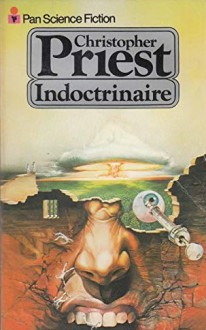



About halfway through, the book shifted in pacing and direction. I definitely liked the second half of the book better, but the amount of space Priest devoted to explaining what was going on in the first half just underscored how it didn't work for me, as it was less of a decipherable mystery than a mess that could only be understood with a retroactive explanation nearly as long as the part I found so problematic.

I'm roughly a third of the way into the book, and the best description of my experience with it is "annoyance." In an afterword Priest calls the stories which served as the origin for this book "willfully obscure science fiction" and it really does describe this almost surreal plot. It's not uninteresting and it's proving a quick read, but at this point I feel as though I'm reading it just for the resolution of what has so far been a pretty cryptic story.
The Big Sleep by Raymond Chandler: The Philip Marlowe books are quintessential noir, with all it apparent flaws of this time period. And Marlowe is such a great character.
War and Peace by Leo Tolstoy: Since we are allowed to name classics, this simply has to be on the list.
Blitzed: Drugs in Nazi Germany by Norman Oehler: The fascinating account how all of Germany was on drugs throughout WWII.
The Blind Assassin by Margarete Atwood: A wonderful story of two sisters in WWII times. Even though I´m a bit fuzzy about the details of the plot (have to reread this book), I still remember how it made me feel while reading it.
The Orenda by Joseph Boyden: A book about first nation Canadians and their struggle with another tribe and the Jesuit priest, who try to convert to Christianity. As this might suggest, this book is incredibly brutal at times, but it is also absolutely amazing.
The Prestige by Christopher Priest: You will finish this book without having the faintest clue what you just have read. It´s so good, though.
In Cold Blood by Truman Capote: I´m comparing every true crime book that I read to this one and not a single one has even come close to Truman Capote´s masterpiece.
The Perfect Storm by Sebastian Junger: The first non-fiction book I have ever and still one of my favorites. The second part of the novel is an edge-of-the-seat reading experience.
The Name of the Rose by Umberto Eco: I don´ think this has been mentiones by anyone, but this simply has to be on the list too. I even enjoyed reading about the page long description of the door fresco.

“Living is not an art, but to write of life is. Life is a series of accidents and anticlimaxes, misremembered and misunderstood, with lessons only dimly learned. Life is disorganized, lacks shape, lacks story.”
In “The Affirmation” by Christopher Priest
A Priest book isn't just a (SF) book. It is the distilled essence of a philosophy, a memoir; a piece of someone's soul. Losing the book is losing that element. On a more mundane level, it is also a memory - I read a book when I was about 7 (a proto-choose-your-own-adventure thing) that I've fitfully searched for ever since and never found, and doing so would put me right back on my nan's sofa on a Saturday afternoon with the wrestling on.
If you're into stuff like this, you can read the full review.